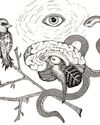
Anyone who’s spent time around young children knows that inevitably, they will try to out-do each other. It usually doesn’t matter what the subject of the argu-ment actually is, only who gets the last word. In order to win this contest, children usually invoke mathematics:
“I’m cooler than you are!” says Child #1
. “No you’re not, I’m twice as cool as you!” replies Child #2
“I’m three times as cool as you!” returns Child #1.
This then continues back and forth with each party one-upping the other with a new, larger number. The problem with this method is that, as we know, you can always find a bigger number and so the argument seems to have no end. That is until one little know-it-all uses this fact to their advantage:
“Whatever you say plus one!” proudly exclaims Child #1. This seemingly childlike manoeuvre has obvious and pro found mathematical power; quite simply, any response his opponent could give will always be quite literally ‘one-upped’ with no effort. I think we know who is winning the argument now.
So far nothing too confounding has happened in the argument. That is until the other child tries to escape their loss by saying: “Well I’m INFINITY coolest,” (although this is not a grammatically correct sentence, we’ll let it slide).
At this point something interesting has occurred. We all know there is no end point to the sequence of numbers, but in order to get the last word in the disagreement this child has somehow managed to get around this fact by talking about the totality of the sequence itself, rather than any of the members of that sequence. But infinity is confusing. Is it a number? Is it a concept? At the very least, it seems like something worth philosophising about.
This story is from the {{IssueName}} edition of {{MagazineName}}.
Start your 7-day Magzter GOLD free trial to access thousands of curated premium stories, and 9,000+ magazines and newspapers.
Already a subscriber ? Sign In
This story is from the {{IssueName}} edition of {{MagazineName}}.
Start your 7-day Magzter GOLD free trial to access thousands of curated premium stories, and 9,000+ magazines and newspapers.
Already a subscriber? Sign In

Anselm (1033-1109)
Martin Jenkins recalls the being of the creator of the ontological argument.

Is Brillo Box an Illustration?
Thomas E. Wartenberg uses Warhol's work to illustrate his theory of illustration.

Why is Freedom So Important To Us?
John Shand explains why free will is basic to humanity.

The Funnel of Righteousness
Peter Worley tells us how to be right, righter, rightest.

We're as Smart as the Universe Gets
James Miles argues, among other things, that E.T. will be like Kim Kardashian, and that the real threat of advanced AI has been misunderstood.

Managing the Mind
Roger Haines contemplates how we consciously manage our minds.

lain McGilchrist's Naturalized Metaphysics
Rogério Severo looks at the brain to see the world anew.

Love & Metaphysics
Peter Graarup Westergaard explains why love is never just physical, with the aid of Donald Davidson's anomalous monism.

Mary Leaves Her Room
Nigel Hems asks, does Mary see colours differently outside her room?

From Birds To Brains
Jonathan Moens considers whether emergence can explain minds from brains.